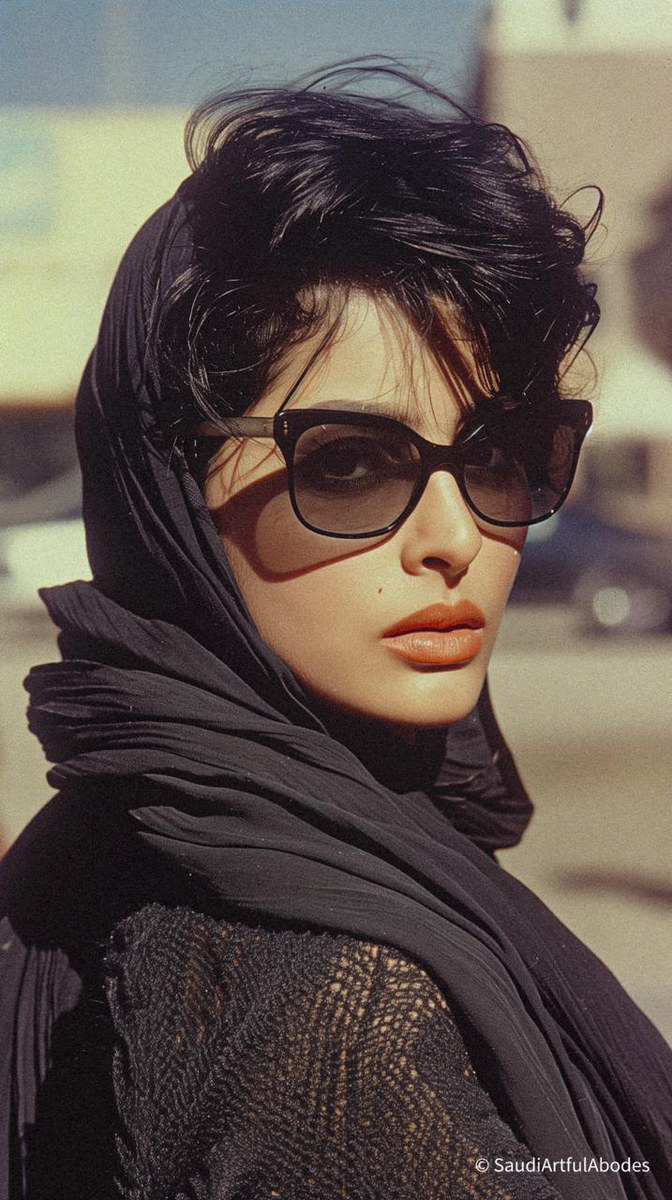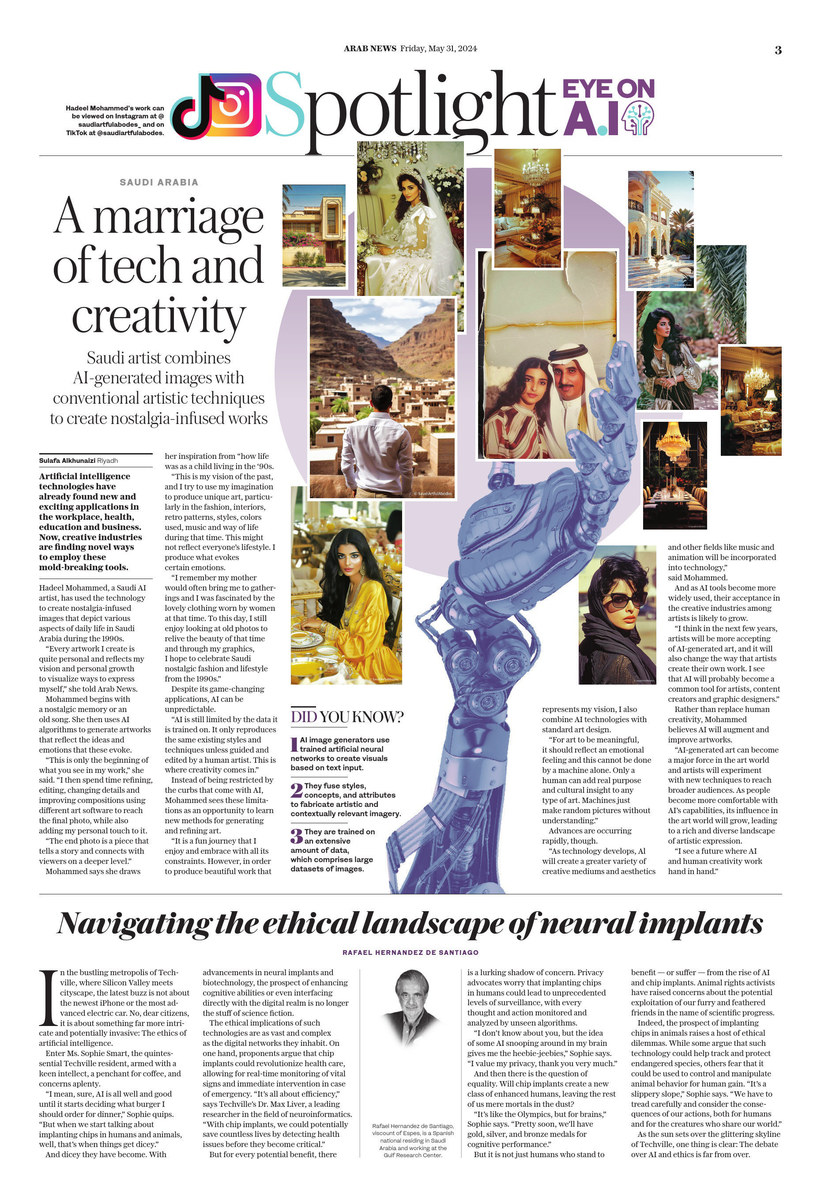RIYADH: Artificial intelligence technologies have already found new and exciting applications in the workplace, health, education and business. Now, creative industries are finding novel ways to employ these mold-breaking tools.
Hadeel Mohammed, a Saudi AI artist, has used the technology to create nostalgia-infused images that depict various aspects of daily life in Saudi Arabia during the 1990s.
About a year ago, Mohammed took an interest in how technology and creativity can combine to make something entirely new, and began experimenting with AI to create bold visuals plucked from her imagination.
After earning a certificate in AI art, she was able to blend various digital editing methods with more conventional artistic techniques.

Saudi AI artist Hadeel Mohammed begins with a nostalgic memory or an old song and then uses AI algorithms to generate artworks that reflect the ideas and emotions that these evoke. (Supplied)
“Every artwork I create is quite personal and reflects my vision and personal growth to visualize ways to express myself,” she told Arab News.
Mohammed begins with a nostalgic memory or an old song. She then uses AI algorithms to generate artworks that reflect the ideas and emotions that these evoke.
“This is only the beginning of what you see in my work,” she said. “I then spend time refining, editing, changing details and improving compositions using different art software to reach the final photo, while also adding my personal touch to it.
“The end photo is a piece that tells a story and connects with viewers on a deeper level.”
Mohammed says she draws her inspiration from “how life was as a child living in the ‘90s.
“This is my vision of the past, and I try to use my imagination to produce unique art, particularly in the fashion, interiors, retro patterns, styles, colors used, music and way of life during that time. This might not reflect everyone’s lifestyle. I produce what evokes certain emotions.
“I remember my mother would often bring me to gatherings and I was fascinated by the lovely clothing worn by women at that time. To this day, I still enjoy looking at old photos to relive the beauty of that time and through my graphics, I hope to celebrate Saudi nostalgic fashion and lifestyle from the 1990s.”
Mohammed says that artworks that reflect the Saudi or Arab ‘90s can be difficult to produce “because AI’s knowledge of ‘female’ features is so limited,” resulting in her having to edit the photos to depict accurate features.
When curating an image, Mohammed focuses on the “mood and vibe” she is looking to convey.
“I love classic styles and use them a lot in my photos. They are timeless and full of elegance and nostalgia. For the color palette, I use earthy tones to bring a sense of coziness and warmth like shades of brown and beige. I remember them being called ‘royalty colors’ back in the ‘90s, while in the ‘80s, pastel colors and metallic accents were more used.”
She draws particular inspiration from the style of Saudi American businesswoman and editor Princess Deena Al-Juhani Abdulaziz for her fashion and her image as a modern and elegant Saudi woman.
Despite its game-changing applications, AI can be unpredictable. Mohammed says there are occasionally issues with photo resolution challenges in post-processing.
“Most of the time, I have to use editing software to change the composition and enhance the photos, as AI’s results sometimes are unpredictable and inaccurate,” she said.
“Photos generated by AI might be good for the screen, but they are not suitable for printing large-sized photos.
“AI is still limited by the data it is trained on. It only reproduces the same existing styles and techniques unless guided and edited by a human artist. This is where creativity comes in.”

Despite its game-changing applications, AI can be unpredictable, says Hadeel Mohammed. (Shutterstock image)
Instead of being restricted by the curbs that come with AI, Mohammed sees these limitations as an opportunity to learn new methods for generating and refining art.
“It is a fun journey that I enjoy and embrace with all its constraints. However, in order to produce beautiful work that represents my vision, I also combine AI technologies with standard art design.
“For art to be meaningful, it should reflect an emotional feeling and this cannot be done by a machine alone. Only a human can add real purpose and cultural insight to any type of art. Machines just make random pictures without understanding.”
Mohammed says AI still requires “the right people to choose the best art and know good art when they see it, as machines make many random photos. Not all of it is appealing.
“In summary, AI alone cannot substitute human vision, guidance, experience, and emotions to make art with true meaning and impact.”
As with all AI tools, advances are occurring rapidly.
“As technology develops, Al will create a greater variety of creative mediums and aesthetics and other fields like music and animation will be incorporated into technology,” said Mohammed.
“Also, algorithms will become more advanced and accessible and will not require much effort to meet our standards or ideas.”
And as AI tools become more widely used, their acceptance in the creative industries among artists is likely to grow.
“I think in the next few years, artists will be more accepting of AI-generated art, and it will also change the way that artists create their own work. I see that AI will probably become a common tool for artists, content creators and graphic designers.”
Rather than replace human creativity, Mohammed believes AI will augment and improve artworks.
“AI-generated art can become a major force in the art world and artists will experiment with new techniques to reach broader audiences. As people become more comfortable with AI’s capabilities, its influence in the art world will grow, leading to a rich and diverse landscape of artistic expression.
“I see a future where AI and human creativity work hand in hand.”
Evidence of this growing acceptance of AI-generated art can be found on Mohammed’s TikTok and Instagram accounts, where she has received positive feedback from her followers.
“I mostly receive a lot of positive feedback, both in comments and private messages,” she said.
“People regularly express their appreciation and thank me for bringing back old memories and feelings. They say that they enjoy and love my content. It makes me happy that, through visualizing memories through art, I can provide positivity and happiness to others.”































